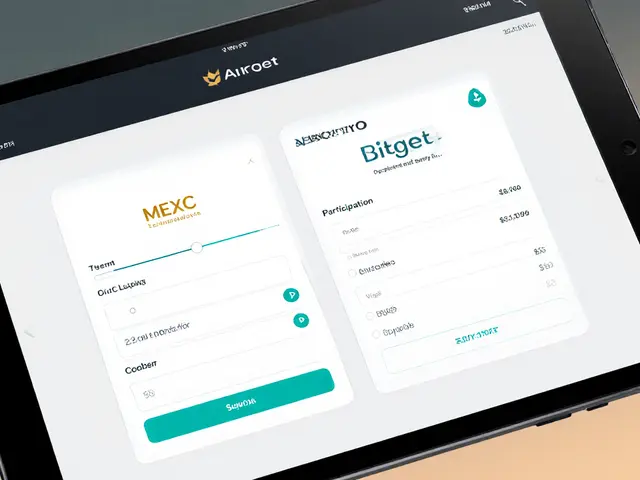SPHYNX Token Price Simulator
Market Cap: $1.13 million
Max Supply: 1.5 billion
Enter a scenario and click "Simulate Price Movement" to see projected price changes.
Sphynx Labs has been marketed as a one‑stop crypto exchange, but it’s really a DeFi ecosystem that bundles trading, staking, yield farming and NFTs into a mobile app. Below you’ll find a deep‑dive into the platform, its native token, user experience, market data and the red flags you should watch before committing any money.
Quick Take
- Sphynx Labs is a decentralized finance (DeFi) app, not a traditional centralized exchange.
- Native token SPHYNX has a max supply of 1.5billion, a market cap around $1.1M and volatile pricing between $0.0007‑$0.0009.
- The mobile app scores 4.9★ on Google Play (1,320 reviews) but mixes praise for its all‑in‑one design with complaints about swapping fees and missing tokens.
- Liquidity is thin - 24‑hr volume ~ $414 - making large trades prone to slippage.
- Technical analysis is bearish; most price forecasts see the token slipping toward $0.0005 by year‑end.
What Is Sphynx Labs?
When you first hear the name, you might think it’s another crypto exchange. In reality, Sphynx Labs is a decentralized finance (DeFi) ecosystem that lives primarily in a mobile application. Launched in 2023, the project set out to combine a Web3 wallet, token swap, staking, yield farming, NFT marketplace and cross‑chain bridge under one roof.
The platform’s philosophy mirrors the broader DeFi movement: users retain custody of their assets, transactions are executed on‑chain, and the service does not collect personal data. This design choices give it a privacy edge, but also shift the onus of security, fee awareness and dispute resolution onto the user.
SPHYNX Token Overview
The SPHYNX token serves as the native utility token for the Sphynx Labs ecosystem. Its key attributes are:
- Maximum supply: 1.5billion tokens (hard cap)
- Current market cap (30Sep2025): ~ $1.13million
- 24‑hour price range: $0.000723 - $0.00089 across major aggregators
- All‑time high: $0.00952555 (12Apr2024)
- All‑time low: $0.00064574 (3Sep2025)
SPHYNX powers fee discounts, staking rewards and governance votes within the app. However, its low market cap places it deep in the #3,800‑#3,900 ranking on most trackers, meaning price swings can be dramatic on modest trade volumes.
App Features & User Experience
Available on the Google Play Store Android app marketplace where the Sphynx Labs app is listed, the application offers a suite of tools that would normally require multiple separate wallets:
- Web3 Multi‑Blockchain Wallet - supports Ethereum, BNB Chain, Polygon and several Layer‑2 solutions.
- Advanced Charting - candlestick, volume and built‑in indicators (RSI, SMA).
- Token Swapping - on‑chain swaps with stop‑loss and limit order options.
- Yield Farming & Staking - lock SPHYNX or partner tokens for APY ranging from 5% to 35%.
- Launchpad - early access to new DeFi projects vetted by the Sphynx team.
- Cross‑Chain Bridge - move assets between supported networks without leaving the app.
- NFT Marketplace - buy, sell and mint NFTs directly from the wallet.
Positive reviews laud the UI’s clean layout and the convenience of having everything in one place. Critics, however, point out two recurring pain points:
- Unexpected swapping fees - users report paying higher than advertised gas and platform fees.
- Missing tokens after swaps - a handful of reviews claim tokens never arrived, sparking accusations of a scam.
Because the app is fully decentralized, there is no traditional customer support desk. Most queries are answered via community channels (Telegram, Discord) which can be slow to react.

Trading Access & Liquidity
SPHYNX is not exclusive to Sphynx Labs. You can also trade the token on centralized venues like Bybit a crypto derivatives exchange that lists SPHYNX and aggregators such as LetsExchange.io a platform offering over 5,700 digital assets for swapping. Bybit’s purchase flow involves:
- Complete Identity Verification Level1.
- Deposit fiat or crypto.
- Place a market order at the current price or a limit order at your target.
Liquidity on these exchanges mirrors the token’s low on‑chain volume - 24‑hour trade volume hovers around $414. Such thin depth means a $10,000 purchase could shift the price by several percent, raising slippage costs.
Technical Outlook & Price Predictions
Current technical indicators paint a bearish picture:
- Price sits below the 50‑day SMA ($0.000863) and 200‑day SMA ($0.000966).
- 14‑day RSI at 48.5 - neutral, but trending downwards.
- Volatility low at 5.31%, yet green days only 43% of the last 30 sessions.
Forecasts from multiple analysts converge on a downward trend:
| Source | 2025 Target | 2029 Target |
|---|---|---|
| CoinCodex | $0.00054 (Oct292025) | - |
| LiteFinance | $0.00050 (year‑end) | - |
| WalletInvestor | $0.00056 (average 2025) | $0.00050 (minimum 2029) |
All three models expect the token to stay under $0.001 for the foreseeable future, with limited upside unless the ecosystem launches a breakthrough feature that drives new demand.
Risks & Red Flags
Investing in Sphynx Labs means accepting a high‑risk profile. Key concerns include:
- Liquidity constraints - thin volume can cause large price impact.
- Fee opacity - swapping fees sometimes exceed the quoted amount, especially during network congestion.
- User‑generated disputes - missing token reports have no official recourse channel.
- Regulatory uncertainty - as a DeFi app, it operates outside traditional licensing regimes, so future crackdowns could affect access.
- Market positioning - rank #3,800+ places it among hundreds of low‑cap projects competing for the same speculative capital.
Potential investors should treat SPHYNX as a speculative asset, allocate only money they can afford to lose, and consider diversifying across more established tokens.
Bottom Line
If you’re after a mobile‑first, all‑in‑one DeFi suite, the Sphynx Labs app delivers a surprisingly rich feature set for a project of its size. The UI is polished, the wallet works across multiple chains, and the staking/yield options look appealing on paper.
But the token itself shows a bearish technical outlook, limited liquidity, and a mixed track record on swaps. The lack of a formal support system means any mishap could end in a loss that’s hard to recover.
Bottom line: enjoy the app for experimenting with DeFi tools, but keep SPHYNX exposure modest until the project proves its fee structure and delivers on its roadmap promises.
Frequently Asked Questions
Is Sphynx Labs a traditional crypto exchange?
No. It is a DeFi ecosystem that provides a wallet, swap, staking and NFT features through a mobile app, not a centralized exchange with order books.
Where can I buy the SPHYNX token?
SPHYNX is listed on several platforms, including Bybit, LetsExchange.io and a few smaller DEX aggregators. You need to complete basic KYC on Bybit before trading there.
What fees should I expect when swapping on the app?
Swaps incur on‑chain gas fees plus a platform fee that can vary from 0.1% to 0.5% depending on network congestion. Users have reported higher fees during peak periods.
How safe is the Sphynx Labs wallet?
Since it’s a non‑custodial DeFi wallet, you control the private keys. Security depends on how you store your seed phrase and your device’s protection. No personal data is collected, but you’re fully responsible for any loss.
What is the long‑term price outlook for SPHYNX?
Most analysts forecast a gradual decline toward $0.0005 by the end of 2025, with limited upside unless the ecosystem launches a high‑demand feature that attracts new users.






Andrew Else
10 July, 2025 . 18:06 PM
Looks like another overhyped DeFi sandbox.
Susan Brindle Kerr
12 July, 2025 . 11:46 AM
The whole thing reeks of greed masquerading as innovation; honest people should stay away.
Jared Carline
14 July, 2025 . 05:26 AM
From a strictly formal perspective, the platform fails to demonstrate sufficient on‑chain transparency, thereby undermining any claim of regulatory compliance.
raghavan veera
15 July, 2025 . 23:06 PM
One could argue that the allure of "all‑in‑one" tools distracts users from the deeper philosophical question: are we truly in control of our assets, or merely illusionists in a digital circus?
Danielle Thompson
17 July, 2025 . 16:46 PM
Nice UI, but keep your exposure small! 👍
Eric Levesque
19 July, 2025 . 10:26 AM
Don't trust the hype; stick to proven chains.
alex demaisip
21 July, 2025 . 04:06 AM
The tokenomics present a classic case of hyper‑inflationary supply dynamics paired with fragmented liquidity pools, which, when modeled via Monte‑Carlo simulations, yield a high variance in price trajectories and an unfavorable Sharpe ratio for speculative investors.
Elmer Detres
22 July, 2025 . 21:46 PM
Stay curious, test the app with tiny amounts, and remember: every experiment is a step toward mastery. 🙂
Tony Young
24 July, 2025 . 15:26 PM
While the interface looks slick, the real story lies in the fee structure-expect gas spikes during congestion, and the platform's own cut can climb to half a percent, eroding marginal gains.
Fiona Padrutt
26 July, 2025 . 09:06 AM
We need more home‑grown solutions like this, not foreign tech dumping on our markets.
Briana Holtsnider
28 July, 2025 . 02:46 AM
The glaring red flags-thin liquidity, opaque fees, and unverified token swaps-make this a textbook example of a risky speculative trap.
Corrie Moxon
29 July, 2025 . 20:26 PM
Give it a try with a dollar or two; you’ll learn a lot about DeFi without risking much.
Jeff Carson
31 July, 2025 . 14:06 PM
Interesting design choice to bundle staking and NFTs together; it could streamline user experience if the underlying contracts are audited.
Alex Yepes
2 August, 2025 . 07:46 AM
In summation, the platform exhibits a commendable breadth of features, yet the paucity of deep liquidity and the persisting fee opacity render it unsuitable for large‑scale capital allocation at this juncture.
Bianca Giagante
4 August, 2025 . 01:26 AM
Wow-what a platform!; the UI is clean; the features are abundant; however, the token’s market cap remains minuscule; liquidity is thin; beware of slippage; always do your own research!!!
Anne Zaya
5 August, 2025 . 19:06 PM
Looks decent, but I’d keep my hopes low until I see real volume.
Emma Szabo
7 August, 2025 . 12:46 PM
Colorful UI, vibrant community, but the token’s price looks like it’s stuck in a low‑key limbo-maybe a splash of fresh utility will give it that needed sparkle.
Fiona Lam
9 August, 2025 . 06:26 AM
Enough of this weak‑handed token-if you want real impact, push for a native governance overhaul now.
OLAOLUWAPO SANDA
11 August, 2025 . 00:06 AM
Most people are blind to the downside; I think the token will keep dropping.
Sumedha Nag
12 August, 2025 . 17:46 PM
Sure, the app looks shiny, but the underlying economics are shaky-don't be fooled.
Holly Harrar
14 August, 2025 . 11:26 AM
Yo, if u wanna dip in, start w/ a lil amount and watch the fees-i seen some crazy suprises.
Vijay Kumar
16 August, 2025 . 05:06 AM
My two cents: try the staking feature with a minimal stake first; it’ll give you a feel for the reward schedule without exposing much capital.
Edgardo Rodriguez
17 August, 2025 . 22:46 PM
What we observe is a classic paradox: the quest for simplicity drives users toward all‑in‑one platforms, yet the resultant complexity of smart contracts often magnifies systemic risk; thus, prudence dictates a measured approach.
mudassir khan
19 August, 2025 . 16:26 PM
The Sphynx Labs venture, upon close examination, manifests a multitude of concerning attributes that merit rigorous scrutiny; first, the token's market capitalization, scattered at merely $1.13 million, underscores its susceptibility to price manipulation, as even modest trade volumes can engender substantial slippage, thereby compromising transactional efficiency. Second, the platform's disclosed fee regime-ranging from 0.1% to 0.5% in addition to volatile on‑chain gas costs-introduces an opaque cost structure that undermines user confidence; third, liquidity metrics reveal a 24‑hour volume of approximately $414, a figure starkly insufficient for sustaining sizeable swaps without disproportionate market impact. Fourth, user reports of missing tokens post‑swap, coupled with the absence of a formalized support mechanism, amplify operational risk and erode recourse pathways. Fifth, the token's technical outlook, as delineated by prevailing SMA and RSI indicators, projects a bearish trajectory, with forecasts converging on a sub‑$0.001 valuation horizon extending to 2025 and beyond. Sixth, regulatory ambiguity persists, given the platform's DeFi classification, which may subject it to future jurisdictional interventions lacking clear compliance frameworks. Seventh, the all‑in‑one design, while aesthetically appealing, amalgamates disparate financial primitives-staking, yield farming, NFT marketplace-within a single smart contract suite, thereby increasing attack surface and systemic fragility. Eighth, the governance model, predicated on SPHYNX token holdings, risks centralization of decision‑making power among early adopters, further exacerbating concentration risk. Ninth, comparative analysis with contemporaneous low‑cap projects illustrates that Sphynx Labs does not possess a distinctive value proposition capable of catalyzing sustained user acquisition or liquidity inflow. Tenth, the platform's reliance on cross‑chain bridges introduces additional vectors for exploits, as evidenced by historical bridge failures across the broader crypto ecosystem. Eleventh, the modest app rating of 4.9★ on Google Play, despite limited review volume, may not accurately reflect broader user sentiment, particularly given reports of fee opacity and token loss. Twelfth, the absence of robust audit documentation or third‑party security certifications leaves the codebase's resilience to adversarial actions in question. Thirteenth, the token’s supply cap of 1.5 billion, juxtaposed with its current market cap, denotes a substantial dilution potential should future token issuance mechanisms be introduced. Fourteenth, the lack of institutional backing or strategic partnerships curtails the platform's capacity to achieve network effects essential for long‑term viability. Finally, prospective investors should internalize that the cumulative risk profile-encompassing liquidity constraints, fee uncertainties, governance centralization, regulatory exposure, and technical vulnerabilities-renders SPHYNX an inherently speculative asset; therefore, allocation should be strictly limited to capital that can be forfeited without jeopardizing broader financial stability.